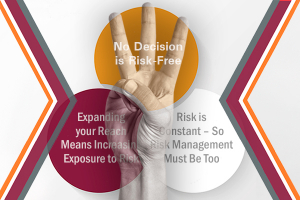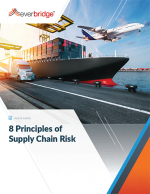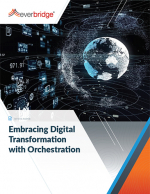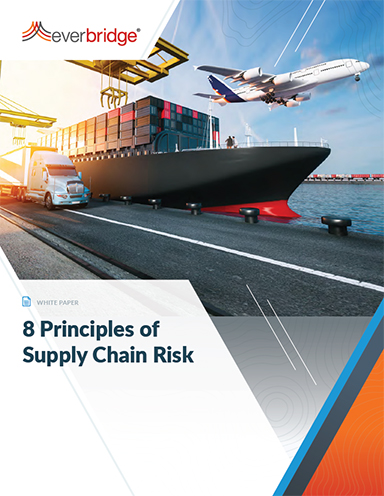8 Principles of Supply Chain Risk
In this white paper, we detail 8 principles that are an accumulation of experiences documented to help guide companies as they mature their supply chain risk management program and make changes to proactively respond to and minimize the impact of risk events.
Operational Risk is a Strategic Issue for All Organizations
From employee safety to cyber threats to damage to reputation, risk events that threaten businesses are ongoing and can occur anywhere and at any time. Nowhere is risk more evident than in the supply chain.
Natural disasters, weather, civil unrest, terrorism, workforce strikes, and even construction and traffic, all can impact your supply chain. These risks can delay or completely disrupt the supply chain, threatening on-time delivery, manufacturing processes, and customer commitments.
It’s impossible to completely eliminate risk from your supply chain. However, organizations can minimize exposure to risk and even eliminate the impact of certain risk events with careful planning, tools, and processes to anticipate and manage risk more effectively.
Managing risk typically involves three key aspects:
- Risk Identification
- Risk Assessment and
- Risk Mitigation
Together these form the tenets of risk management, and it is important to understand that these tenets work together and cannot be separated or eliminated. For example, you can identify a risk situation and understand its impact, but if action is required and is not taken, then the resulting impact still occurs. Similarly, if you identify a threat after it has occurred, then the value of assessment is only to understand how to avoid it in the future and the impact of that event is still felt. Therefore, any effective risk management solution must include these three elements.
Why is this valuable for your company? Because if you’re better prepared to respond to risk events than your competitors, supply chain risk can become an opportunity for competitive advantage and differentiation.
So how can companies better take command of risk in their supply chains and even leverage risk management as a competitive advantage?
Download this White Paper and find out how - and don't miss our Webinar "Avoiding Supply Chain Uncertainty" (described below):
 HOW TO USE PREDICTIVE INTELLIGENCE AND ANALYTICS
HOW TO USE PREDICTIVE INTELLIGENCE AND ANALYTICS
WEBINAR: On-Demand
Major supply chain breakdowns have spurred an industry-wide awakening that has business continuity and resilience leaders eager for new solutions. So far in 2021 alone, the Suez canal blockage caused global product shortages on numerous critical goods. The February freeze in Texas triggered mass blackouts that led to chemical plant shutdowns, causing a shortage of raw materials needed for products such as medical face shields and smartphones. And continued COVID outbreaks in Taiwan have impeded tech manufacturing worldwide.
Featuring intelligence and risk expert, Shehrina Kamal, join this webinar to learn:
- Top 5 predictions for the second half of 2021, and real-life failures and successes
- Lessons learned from recent interruptions, including ocean capacity challenges and US air cargo congestions
- How to improve supply chain security automation and processes to turn supply chain risk into a competitive advantage
Don't Miss This On-Demand Event VIEW NOW
What’s Related




Favorites






